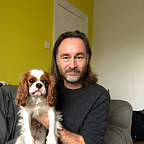Welcome, Big Sis Warrior Shepherd
Why do we let other people tell our stories for us? Why look at the competition for inspiration, or fall back on tired tools tired tools like ‘brand archetypes’, made up by Jung 100 years ago?
Why not write our own archetypes, fit for the world we live in (and more importantly, the world we want)?
The other day I tuned into a talk by Peter McGuinness, President and COO of Chobani (a US Greek yoghurt brand) talking about their approach to business. Chobani are famous for their progressive policies: setting their own minimum wage, offering childcare, hiring refugees, closing their factories to enable workers to vote. Chobani means ‘shepherd’ in Turkish, and the founder Hamdi Ulukaya wanted to embody the brand with that spirit of compassion and hard work.
But Peter McGuinness talks about the brand personality as a ‘warrior shepherd’ — fiercely protective of staff, but fiercely competitive too. By being both/and; not either/or, Chobani’s leadership are breaking down one of the core myths around brand purpose — they can be compassionate and kind, while also pursuing profit and, in McGuinness’ words, ‘crushing the competition’. Profit and growth enables them to do more good. And doing more good gives them an incentive to grow and make money. It’s a virtuous circle and it seems to be working, with Chobani becoming the #1 Greek yoghurt in the US, and the #2 yoghurt brand overall. (And no, I don’t know who #1 is).
That dual personality approach also embodies something that’s essential to brand development — tension. It brings a unique energy that’s needed to help brands grow, innovate and stand out. Because great brands are rarely one thing, but in the tension comes the opportunity. (That’s something brand archetypes can’t compute, with their implication that there are only a certain number of fixed stories, characters, personality types. No more, no less, no different. And no tension.)
There’s another great example of tension at work at Fintech brand Cleo. Aimed at helping young people manage their money better, Cleo operates in a hugely crowded market, full of apps with similar, AI-driven functionality. But it’s personality that helps Cleo stand out, with a team of UX writers creating something they call ‘Big Sis Energy’. Cleo’s not afraid to tick its users off, lambasting them for poor financial decisions with sassy slang, GIFs and emojis. Cleo embodies the caring meanness of a big sister, relentlessly pointing out your faults but also helping you do better.
It’s not just mean. And it’s not just kind. It’s both. It’s piss-taking with purpose. And it also offers an alternative to the docility of female AIs like Siri and Alexa — if you’re rude to Cleo, she’ll let you know.
These brands are embracing tension to build unique personalities; as a way to stand out and guide decisions, not just look & language (Chobani have stood out for their progressive, early and decisive approach during the COVID pandemic. Because they know who they are, they know what to do). They’re not letting other people write their stories, be it Jung’s brand archetypes, the expectations of their sector, or the market. They’re writing their own, celebrating plurality, complexity and difference.
So, who’s writing your story? What’s your version of the Warrior Shepherd or Big Sis Energy? Finding it could make all the difference to your future.
